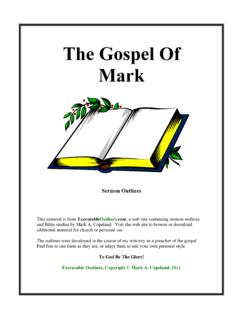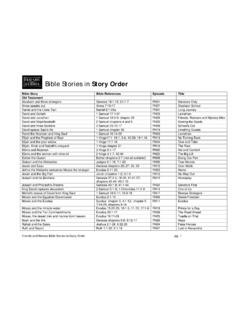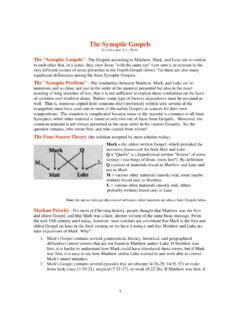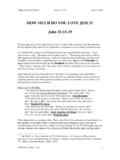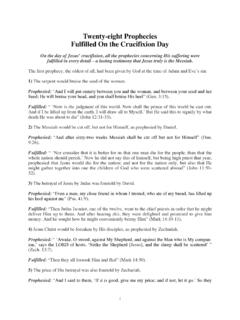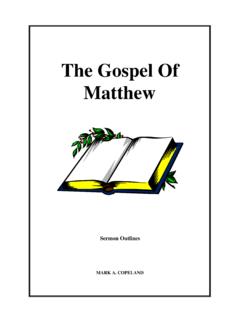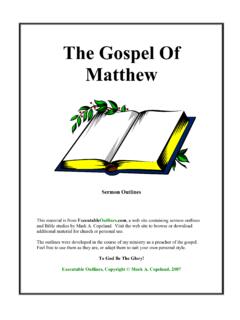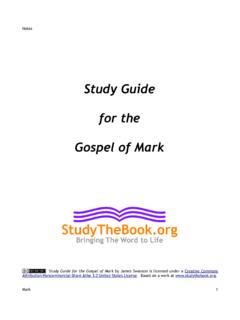Transcription of The Life of Christ
1 The life of Christ (Study Guide to the Four Gospel Accounts: Matthew, Mark, luke and John) First Quarter Keith Sharp and William Stewart The life of Christ (Study Guide to the Four Gospel Accounts: Matthew, Mark, luke and John) To the Teacher The life of Christ (Study Guide to the Four Gospel Accounts: Matthew, Mark, luke and John) is a Bible study guide for teenagers and adults to be used in Bible classes in local congregations. This workbook is not intended to replace the word of God as the class text. Nor is it a commentary. Rather, it consists of questions within the framework of an analytical outline designed to help the student study properly, so he can discover for himself what the Bible teaches. My experience is that adult and teenage classes generally do not like graded lessons. Thus, this book has no grading system. However, these same classes have a tendency to bog down or stray from the lesson unless some time goals are established and followed.
2 Thus, this study guide is designed to lead the student through the life of Jesus Christ in fifty-two lessons. Beginning with lesson two, each lesson starts with a memory verse. I believe committing the word of God to memory is an important, often neglected aspect of the lives of Christians. The workbook contains several types of questions: terms to define, places to locate, people to identify, fact questions, thought questions, reports to the class, charts and maps to fill in, as well as reviews. Each question has a purpose. There are no pointless, filler questions, trick questions or true-false questions. Although a particular word may appear many times in the four accounts of the life of Jesus, it will be given as a term to define only once, unless it is later translated from a different Greek word, used in a different sense, or has a special importance in a later context.
3 The same principle is true of places to locate and people to identify. These questions are designed to help the student understand the language of the text and place the events in their historical and geographical settings. There is a glossary in the back of the book which defines the terms and identifies the people. There are maps in the back of the book with blank maps beneath each to be filled in from the map above. The student should find each place to locate on the appropriate map and write in its name in the proper place on the blank map below. To the right of each place to locate is the name of the map on which it is found. Foreword ii Fact questions are for the purpose of checking the student s knowledge of what he read. Thought questions are designed to measure the student s understanding of and ability to apply the text. Each class should end with a review orally in class of the theme of each section studied to that point.
4 Beginning with lesson two, each class should start with the oral review found at the first of each lesson. In this way the students will be able to remember the general framework of the life of Christ and where each event is found in the Bible. The facts to review are located together between lesson thirteen and the maps. Because the lessons call for a fast overview of the life of the Lord, it is crucial that each student study his lesson and complete the questions outside class. It is best in class to concentrate on the thought questions and to only spend time on other questions with which some student might have trouble. In addition to reading the entire biblical text to be studied in each lesson, the student should read each passage again separately as he comes to it in the analytical outline. Finally, in order to answer the fact and thought questions, every student must read the passage that answers each question.
5 If the student will follow the suggested steps in the lesson, he will read each verse of the lesson three times: beginning with the longest for overall grasp, then shorter reading for outline, and finally shortest reading for analysis. The questions are based on the New King James Version of the Bible. It minimizes confusion over the text when the teacher and all the students study from the same translation. No work book can even begin to replace a competent teacher, with a good working knowledge of the Scriptures, an unswerving love of and loyalty to truth, a deep faith in God and His word, a pure life , an humble opinion of himself, an understanding of and love for his students, and the ability to communicate. I hope and pray this volume is useful to you in learning more about the life of our Lord Jesus Christ . May it deepen your faith in Him, help you to understand His will, equip you to defend the faith and teach it to others, and help prepare you to serve Him who left heaven to serve His Father and us.
6 - The Author The life of Christ iii The life of Christ (Study Guide to the Four Gospel Accounts: Matthew, Mark, luke and John) Course Plan We will study the life of Christ in fifty two lessons. Lesson One: Introduction to the Four Gospel Accounts Lesson Two: Introduction to Christ (Matthew 1:1-17; luke 1:1-25; 3:23-38; John 1:1-18) Lesson Three: Births of John and Jesus (Matthew 1:18-25; luke 1:26 - 2:7) Lesson Four: Jesus Childhood (Matthew 2:1-23; luke 2:8-52) Lesson Five: Beginnings of the Ministries of John and Jesus (Matthew 3:1 - 4:11; Mark 1:1-13; luke 3:1-22; 4:1-13) Lesson Six: John s First Testimony and Jesus Early Work (John 1:19 - 3:21) Lesson Seven: John s Further Testimony and Jesus Further Work (Matthew 4:12,17; Mark 1:14-15; luke 3:19-20; 4:14-15; John 3:22 - 4:54) Lesson Eight: Jesus in Galilee (Matthew 4:13-16,18-25; 8:2-4,14-17; Mark 1:16-45; luke 4:31-44; 5:1-16) Lesson Nine: Jesus in Galilee and Judea (Matthew 9:2-9; Mark 2:1-14; luke 5:17-28.)
7 John 5:1-47) Lesson Ten: Jesus in Judea and Galilee (Matthew 10:2-4; 12:1-21; Mark 2:23 - 3:19; luke 6:1-16) Lesson Eleven: The Sermon on the Mount: Part 1 (Matthew 5:1-48; luke 6:17-30,32-36) Lesson Twelve: The Sermon on the Mount: Part 2 (Matthew 6:1-34) Lesson Thirteen: The Sermon on the Mount: Part 3 (Matthew 7:1-29; luke 6:37-49) Lesson Fourteen: Healing and Teaching in Galilee (Matthew 8:1,5-13; 11:2-30; luke 7:1-35) Lesson Fifteen: Teaching in Galilee (Matthew 12:22-45; Mark 3:20-30; luke 7:36-50; 8:1-3; 11:14-36) Lesson Sixteen: Further Teaching in Galilee (Matthew 12:46-50; Mark 3:31-35; luke 8:19-21; 11:37 - 13:9) Lesson Seventeen: Introduction to Parables (Matthew 13:1-23; Mark 4:1-20; luke 8:4-15) Lesson Eighteen: The First Great Group of Parables (Matthew 13:24-53; Mark 4:21-34; luke 8:16-18) Lesson Nineteen: Galilean Ministry (Matthew 8:18-34; 9:1,10-13; Mark 2:15-17; 4:35 - 5:21; luke 5:29-32; 8:22-40) Lesson Twenty: Teaching and Healing in Galilee (Matthew 9:14-34; Mark 2:18-22; 5:22-43; luke 5:33-39; 8:41-56) Lesson Twenty One: From Nazareth to All Israel (Matthew 13:54-58; 9:35 - 10:1; 10:5 - 11:1; Mark 6:1-13; luke 4:16 - 31; 9:1-6) Lesson Twenty Two: John s Death and Jesus Retirement (Matthew 14:1-21; Mark 6:14-44; luke 9:7-17; John 6:1-14) Lesson Twenty Three: From Popularity to Rejection (Matthew 14:22-36; Mark 6:45-56; John 6:15 - 7:1) Lesson Twenty Four: Teaching and Healing in Galilee (Matthew 15:1-28; Mark 7:1-30; John 7:1) Lesson Twenty Five: More Teaching and Healing (Matthew 15:29 - 16:20; Mark 7:31 - 8:30; luke 9:18-21) Lesson Twenty Six: Preparing the Disciples (Matthew 16:21 - 17:27.
8 Mark 8:31 - 9:32; luke 9:22-45) Lesson Twenty Seven: Capernaum to Jerusalem (Matthew 18:1-35; Mark 9:33-50; luke 9:46-62; John 7:2-10) Lesson Twenty Eight: Jesus at the Feast of Tabernacles in Jerusalem (John 7:11 - 8:59) Lesson Twenty Nine: Teaching in Judea ( luke 10:1-24; John 9:1 - 10:21) Lesson Thirty: Jesus in Judea ( luke 10:25 - 11:13; 13:10-30; John 10:22-42) Lesson Thirty One: Teaching in Perea ( luke 13:31 - 15:32) Lesson Thirty Two: Great Lessons and a Great Miracle ( luke 16:1 - 17:10; John 11:1-46) Foreword iv Lesson Thirty Three: Jesus Retires from and Returns to Judea (Matthew 19:1-2; Mark 10:1; luke 17:11 - 18:14; John 11:47-54) Lesson Thirty Four: Lessons in Judea (Matthew 19:3-30; Mark 10:2-31; luke 18:15-30) Lesson Thirty Five: Teaching and Healing on the Way to Jerusalem (Matthew 20:1-34; Mark 10:32-52; luke 18:31 - 19:10) Lesson Thirty Six: Completing the Journey to Jerusalem (Matthew 21:1-11,14-17; 26:6-13; Mark 11:1-11; 14:3-9; luke 19:11-44; John 11:55 - 12:19) Lesson Thirty Seven: Beginning the Last Week in Jerusalem (Matthew 21:12-13,18-32; Mark 11:12-33; luke 19:45 - 20:8; 21:37-38) Lesson Thirty Eight: Jesus Teaches in Jerusalem (Matthew 21:33 - 22:22; Mark 12:1-17; luke 20:9-26) Lesson Thirty Nine: Jesus Debates in Jerusalem (Matthew 22:23-46; Mark 12:18-37; luke 20:27-44) Lesson Forty: Teaching in the Temple (Matthew 23:1-39; Mark 12:38-44; luke 20:45 - 21:4; John 12:20-50) Lesson Forty One: Jesus Foretells the Destruction of Jerusalem (Matthew 24:1-34; Mark 13:1-30; luke 21:5-32) Lesson Forty Two: Jesus Foretell His Second Coming (Matthew 24:35 - 25:46; Mark 13:31-37.
9 luke 21:33-36) Lesson Forty Three: Preparation for Death (Matthew 26:1-5,14-20; Mark 14:1-2,10-17; luke 22:1-18,24-30; John 13:1-20) Lesson Forty Four: Preparing - Betrayal, Denial, Remembrance (Matthew 26:21-29,31-35; Mark 14:18-25,27-31; luke 22:19-23,31-38; John 13:21-38) Lesson Forty Five: Jesus Farewell Discourse to His Apostles (John 14:1 - 16:33) Lesson Forty Six: The Lord s Prayer (Matthew 26:30,36-46; Mark 14:26,32-42; luke 22:39-46; John 17:1 - 18:1) Lesson Forty Seven: The Jewish Trial (Matthew 26:47 - 27:2; Mark 14:43 - 15:1; luke 22:47 - 23:1; John 18:2-27) Lesson Forty Eight: The Roman Trial (Matthew 27:11-30; Mark 15:2-19; luke 23:2-25; John 18:28 - 19:16) Lesson Forty Nine: It Is Finished (Matthew 27:3-10; Mark 15:20-41; luke 23:26-49; John 19L7-30) Lesson Fifty: He is Risen! (Matthew 27:57 - 28:8; Mark 15:42 - 16:8; luke 23:50 - 24:8,12; John 19:31 - 20:8) Lesson Fifty One: The Witnesses (Matthew 28:9-15; Mark 16:9-14; luke 24:9-11,13-35; John 20:11-25) Lesson Fifty Two: Final Appearances and Ascension (Matthew 28:16-20; Mark 16:15-20; luke 24:44-53; John 20:26 - 21:35; Acts 1:1-11; 20:35; 1 Corinthians 15:3-7) Lesson One Introduction to the Four Gospel Accounts The Four Gospel Accounts The word translated "gospel" in the New Testament means good news.
10 This term is used to describe the entire message which came through Christ , the New Testament (Galatians 1:6-12). However, the books which record the life of Jesus - Matthew, Mark, luke , and John - are popularly called "the Four Gospels." They are the only authoritative sources of information on virtually all the life of Christ . These books are the only accurate records of the historical facts of His life , particularly of His ministry, and the primary records of what He taught. Their overall purpose is stated by John near the close of His account: .. these are written that you may believe that Jesus is the Christ , the Son of God, and that believing you may have life in His name (John 20:31). Differences in Accounts Why are there four books in the New Testament which tell the story of the life of Christ ? And why are there so many differences between them?

